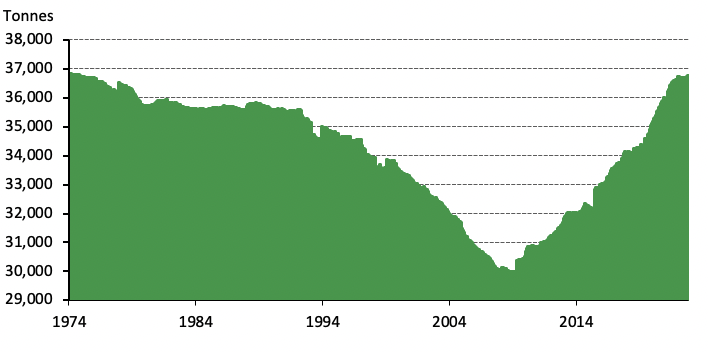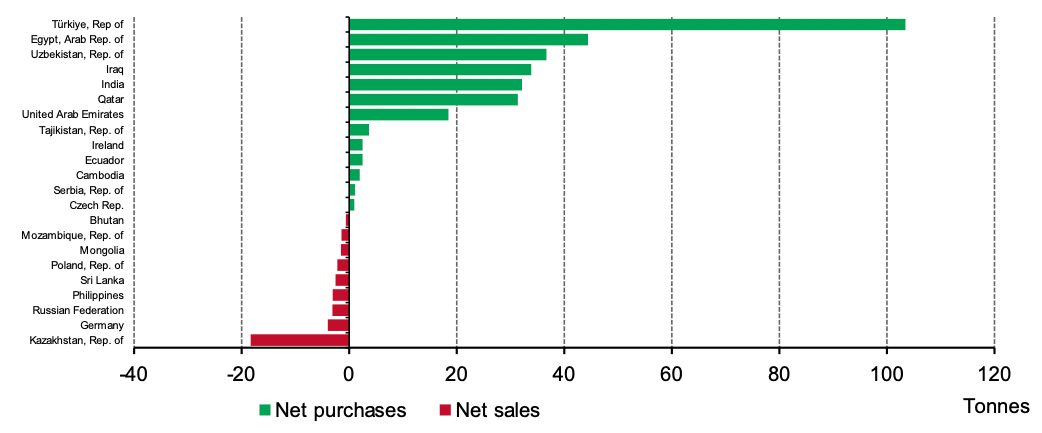Central banks continue to accumulate gold according to the latest data available.1 In October – data is lagged by two months – central banks added a further net 31t of gold to international reserves (-41% m-o-m). This initial figure helps lifts global official gold reserves to its highest level since November 1974 (36,782t).
Central banks maintain their appetite for gold
2 December, 2022
Gold purchases were limited to a handful of central banks in October, while none reported a meaningful decline in their gold reserves. The Central Bank of the UAE was the largest buyer in October, adding just over 9t to its gold reserves. This takes y-t-d net purchases to 18t and lifts total gold reserves to almost 74t (3% of total reserves).
The Central Bank of Türkiye (Turkey), the largest gold buyer y-t-d, bought a further 9t of gold in October.2 Its y-t-d net purchases now total 103t, the highest level of buying since 2019 (126t), with gold reserves standing at 498t (27% of total reserves).
The Central Bank of the Republic of Uzbekistan bought a further 9t of gold during the month – the same volume of gold for the fifth consecutive month. Y-t-d net buying now amounts to 37t; total gold reserves to 399t. The National Bank of Kazakhstan added 3t to its official gold reserves in October. This lowers y-t-d net sales to 18t, with total official gold reserves standing at 384t.
The Central Bank of Qatar added 1t to its gold reserves during the month, taking gold reserves to 88t (11% of total reserves). We have updated out dataset to include activity from August, September and October based on data direct from the central bank as this has not yet been reported to the IMF.3 This shows that the central bank bought an estimated 15t during this three month period, taking its y-t-d net purchases to 31t. The Reserve Bank of India also increased its gold reserves by 1t in October, with gold reserves standing at 786t.
Year-to-date central bank net purchases and sales*
Other noteworthy changes to the dataset:
- Recently published data by the IMF shows that the Central Bank of Sri Lanka has sold almost 3t of gold so far this year, with all sales coming in Q1. Official gold reserves now total less than 0.5t at the end of September.
- Updated IMF data shows that the National Bank of Cambodia has bought a net 2t to end-September. Purchases were made between July-September, lifting total gold reserves to 52t (16% of total reserves) – a new record high.
As we noted in our recently published Gold Demand Trends report: “The continued trend of official sector demand for gold corroborates findings from our 2022 annual central bank survey, in which one-quarter of respondents stated their intention to increase gold reserves in the next 12 months (up from one-fifth in in 2021).”
Looking ahead, while sporadic selling can’t be discounted during the final two months of the year, central banks remain on course to register a strong year of net buying in 2022.
Footnotes
1 Our data set is based on IMF data but is supplemented with data from respective central banks where it is available and not reported through the IMF at the time of publication. This data may be revised in our next monthly update should more data become available.
2 Türkiye official sector gold reserves are the sum of central bank owned gold and Treasury gold holdings. This is equivalent to gross gold reserves less all gold held at the central bank in relation to commercial sector gold policies, such as the Reserve Option Mechanism (ROM), collateral, deposits, and swaps. Please see this link for information on this methodology: https://www.gold.org/download/file/16208/Central-bank-stats-methodology-technical-adjustments.pdf
3 Estimated gold holdings and changes are derived from value figures provided by the central bank. These figures may be adjusted based on data reported to the IMF.


